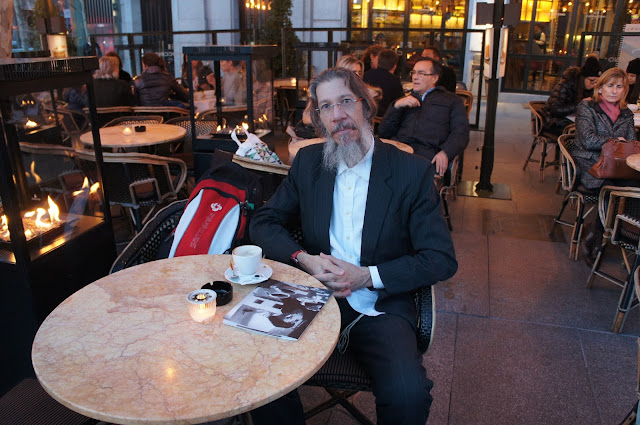JACOB JR, MY JEWISH WORLD. The 615th commandment
Shalom! World.
We must work to uphold the Torah of universal human rights.
Holocaust Remembrance Day memorializes the victims of the Nazis. Observance of this day, though, is also meant to inspire a response from us about how to ensure that such horrible atrocities never occur in our world again.
Noted philosopher and theologian, Rabbi Emil Fackenheim z”l, taught that the Holocaust defies any attempt to locate meaning in it. Indeed, it would be scandalously disrespectful to the victims to “justify” their murder by extrapolating some higher meaning from the Shoah’s happening, a blasphemy to find some purpose or reason to the presence of such radical evil in God’s world and in the capability of human beings – created in God’s own Image – both to enact such evil and to be victimized by it. And yet, Fackenheim noted, a particularly Jewish response to the Shoah is nevertheless imperative. A universal response of all humanity to the Holocaust is no less obligatory.
IT IS interesting to note how two very different sets of “responses” to the Shoah are heard frequently among Jews here in Israel and around the world. They reflect a shared sense of urgent necessity in responding here today because of what happened there then. At the same time, they demonstrate almost opposite worldviews and understandings of Israel’s purpose, and lead toward totally inverse political perspectives and often contradictory activist involvements.
One response is that, essentially, Israel must do anything it wants or needs to do in order to defend itself from hateful enemies set on perpetrating a second holocaust by destroying both the Jewish State.
The other is that precisely because of our experience as Jews in the Holocaust and through our history littered with injustice and tragedy, we ourselves must make sure that Israel of all places is a nation that stringently safeguards human rights even in the most difficult of circumstances and establishes, in the words of Israel’s Declaration of Independence, a nation that “foster[s] the development of the country for the benefit of all its inhabitants; [a nation] based on freedom, justice and peace as envisaged by the prophets of Israel.”
Indeed, both the physical and spiritual security of the Jewish People and the State of Israel is best guaranteed by the strength of universal human rights law enforced by the collective nations of the world and by Israel’s own democracy, its legal system based on the rule of just law, its commitment to human rights, and – ultimately – to the achievement of peace.
Both these responses recognize the absolute importance of protecting the Jewish People and preventing a second Holocaust. In fact, it was the same Rabbi Fackenheim who argued that from the experience of the Holocaust was heard a “614th commandment”: We are commanded not to give Hitler posthumous victories, neither by perishing as a People, by forgetting what was done to us, by denying or despairing of God, nor by ceasing to work towards making the earth a place of holiness, the Kingdom of God.
Our failure to observe this new 614th commandment would transform the world into a meaningless place in which God is dead or irrelevant and everything is permitted.
ARE THESE two types of responses to the Holocaust commonly heard amongst Jews today compatible with one another? Does one response or the other better answer the requirements of the 614th commandment? Must some “middle ground” be found, or must we choose one response or the other? How do we respond to the real threats that face us even as we wield considerable power and immense responsibility both to protect ourselves and to deal justly, righteously, and honestly with our neighbors, the Palestinians? When Israel strengthens international universal human rights institutions, are its own defenses thereby strengthened?
Perhaps we can now sense a 615th commandment, born of the 614th and the totality of the 613 before it: We must work to uphold the Torah of universal human rights.
Although the idea of universal human rights has precedents before the Holocaust, it is only after the Shoah – because of the Shoah – that humanity’s collective feeling and understanding crystallized around the need for a system of international human rights law and protections. The Preamble to the UDHR clearly notes that the world’s attempt to legislate for human rights values is the needed response of humanity to the Holocaust’s “barbarous acts which have outraged the conscience of mankind.” Indeed, Rene Cassin – the French Jewish social democrat who played a leading role in drafting the Universal Declaration of Human Rights (UDHR) – observed during the UN General Assembly’s debate on accepting the draft of the UDHR, that “something new has entered the world…the first document about moral value adopted by an assembly of the human community.”
On Holocaust Remembrance Day, as we memorialize the myriad victims and recall their unimaginable suffering and degradation, we should invite the worldwide Jewish community to consider its response to this “epoch-making event” in our recent history. The formulation of the UDHR, and the international human rights conventions and laws based upon it, is the whole of humanity’s best effort to ensure no holocaust can ever happen again.
A particularly Jewish response to the Holocaust can and must be a turn away from the never-ending fear that our enemies will continue to try to destroy us, and instead to turn towards the hope – a wary hope, but hope nonetheless – that fortifying the abilities of Israel and the world community together to defend universal human rights is the best defense of the Jewish People and all other peoples against the kinds of evil whose victims we memorialize today.
The writer is the development director of Rabbis for Human Rights (RHR) and is the founder and former director of the Human Rights Yeshiva Program at Hebrew university’s Hillel.




Comments
Post a Comment